
Unclaimed Money Lookup - Pennsylvania
Free Pennsylvania Unclaimed Money Lookup
We receive referral fees from partners (advertising disclosure)
The information we provide you is free of charge and a result of extensive research by our home warranty experts. We use affiliate links on our site that provide us with referral commissions. While this fact may not influence the information we provide, it may affect the positioning of this information.
(advertising disclosure)
The information we provide you is free of charge and a result of extensive research by our home warranty experts. We use affiliate links on our site that provide us with referral commissions. While this fact may not influence the information we provide, it may affect the positioning of this information.

Pennsylvania Unclaimed Money -
The Ultimate Guide 2026
- UPDATED February 2026
Find out how you can claim unclaimed money and property in Pennsylvania in our ultimate guide to the Keystone State.
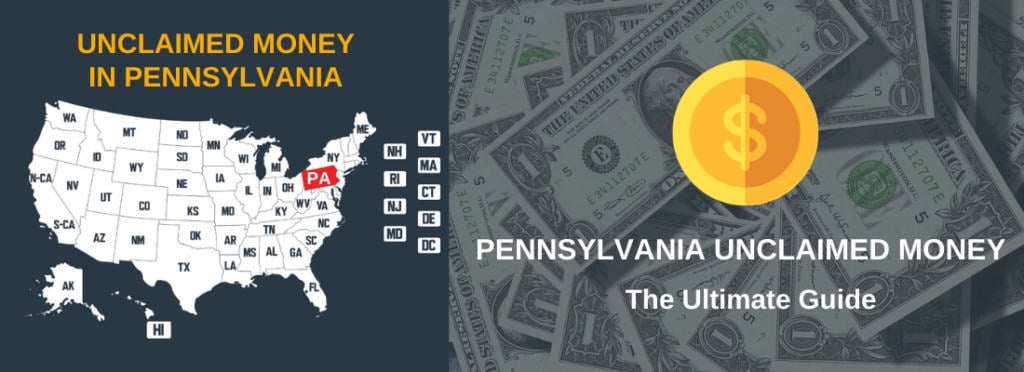
Contents
- Your Guide to Unclaimed Property in Pennsylvania
- What is Unclaimed Property?
- How to Find Unclaimed Property in Pennsylvania
- How to Claim Assets in Pennsylvania
- What Information Does Pennsylvania Require from a Claimant?
- How Much Unclaimed Property Does Pennsylvania Have?
- Unclaimed Property Laws in Pennsylvania

Your Guide to Unclaimed Property in Pennsylvania
Roughly 10% of all of the people who live in Pennsylvania have unclaimed money held by the state. Though you might think that you’re too careful to ever lose your property, mistakes can always happen. You might lose out on your final paycheck because you moved and didn’t update your old job. With a bank account, you may avoid closing an account that has a few dollars left in it and not know that the bank needs to keep the money and the interest that it earned safe for you.

Pennsylvania does a good job of keeping all the unclaimed money that institutions and organizations hand over every year. The Pennsylvania Treasurer in Harrisburg will process each claim that it receives and add it to the online database that you can use at home. This department adds millions of dollars in tangible and intangible property every year. Our ultimate guide to unclaimed property in Pennsylvania offers all the information that you need to get money from the Keystone State.
What is Unclaimed Property?
Home to large cities such as Philadelphia and Pittsburgh along with some rural towns, Pennsylvania has millions of residents who might find unclaimed property listed in their names online. The state refers to unclaimed property as intangible or tangible property that the owner abandoned. While some types of property become abandoned when the owner passes away, others do so because the owner simply has no contact with the holding organization. The organization may refer to the property as dormant for a year or longer and then note that it is abandoned and should go to the state.
Most of the property that you see is intangible, which means that it exists, but you cannot reach out and touch it. A bank account is just one example. Banks must agree to keep accounts open for a specific period of time that can range from one to three years.
If the account owner does not claim it, it will go to the state. Both checking and savings account that list at least one owner will appear in the Pennsylvania database.
Intangible property also refers to any uncashed checks that list who owns the money that the check holds. If you lived in Harrisburg and then moved to a different city, you may find that the company you had water through issued a refund to you. You may find the security deposit from your former landlord or your deposit from the power company. Even if you forward your mail to your new address, it can take a few weeks for the process to begin. Many people miss some important mail when they move and don’t even know it.
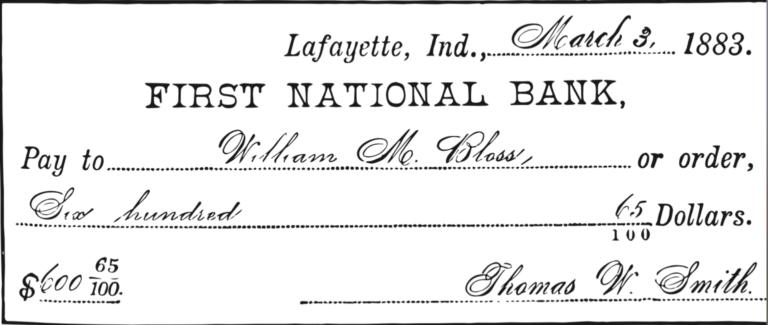
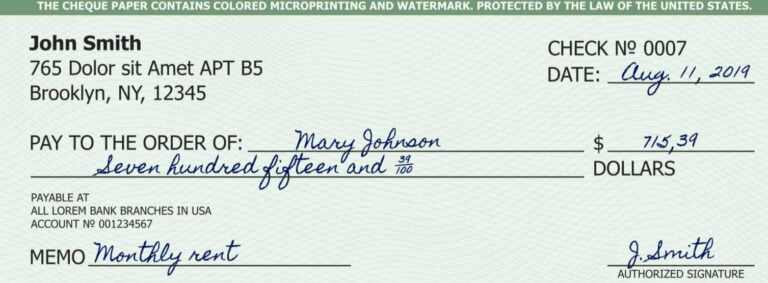
Insurance payments and premiums are also available through the Pennsylvania database. When you purchase a life insurance policy, the insurer requires that you list the names of any people who will benefit from your policy. You can name just one beneficiary, too. Insurers will make attempts to find the designated beneficiary after the death of a client, but they may have problems finding the individual, especially if they lived in a different state. If someone in your life named you as a life insurance beneficiary, Pennsylvania gives you the right to find the check associated with the policy through the online system and claim it.

You’ll also find different types of tangible property listed in the Pennsylvania system. Military medals are just one example. Many of these items go to the state after the holder of a safe deposit box opens the box and checks on the contents. The state won’t accept certain types of property such as weapons or bicycles. It will accept jewelry, gift cards, historical papers, cash and other items with a high value. Pennsylvania will hold the property in its vault and keep it safe for the owners or anyone else who can claim those items. We’ll go over how to claim tangible property later.
How to Find Unclaimed Property in Pennsylvania
To find your unclaimed property, you need to check with the Pennsylvania Treasury. This state government department holds all types of property for owners. You can find your property in a few easy steps.
Step 1: Visit the Unclaimed Property Division of the Pennsylvania Treasury. Look for the box labeled “Start Your Search Here.”

Step 2: Type the name of a company or just your last name in the top box. Pennsylvania gives you the option of adding your first and/or middle names and the city and/or zip code where you lived. You can search with just your name though.
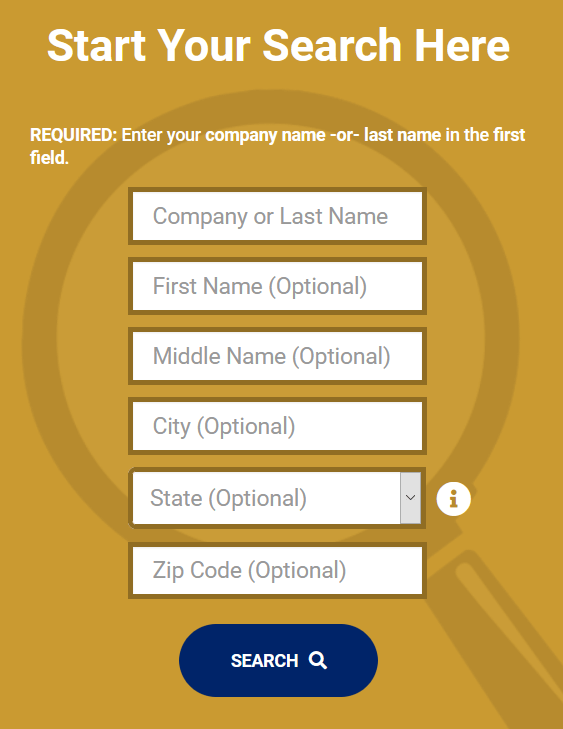
Step 3: Check the chart on the top of the page to make sure that you understand the meaning behind the colors attached to assets. White assets are those that a single owner can claim, while gray assets have two or more owners. If you see a green asset, you need to contact the treasurer to see if you can claim it.
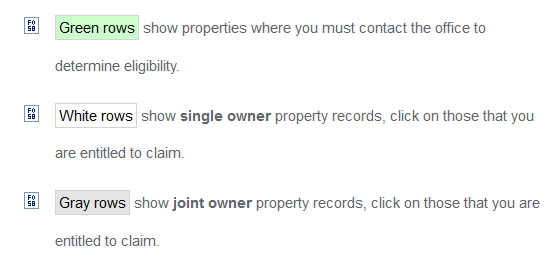
Step 4: Scroll down to find all the Pennsylvania assets that match your search. The “Amount” column shows if the property has a value of more or less than $100. Looking at the “Holder” column lets you see who held the property. You also need to look at the name and address of the property owner.
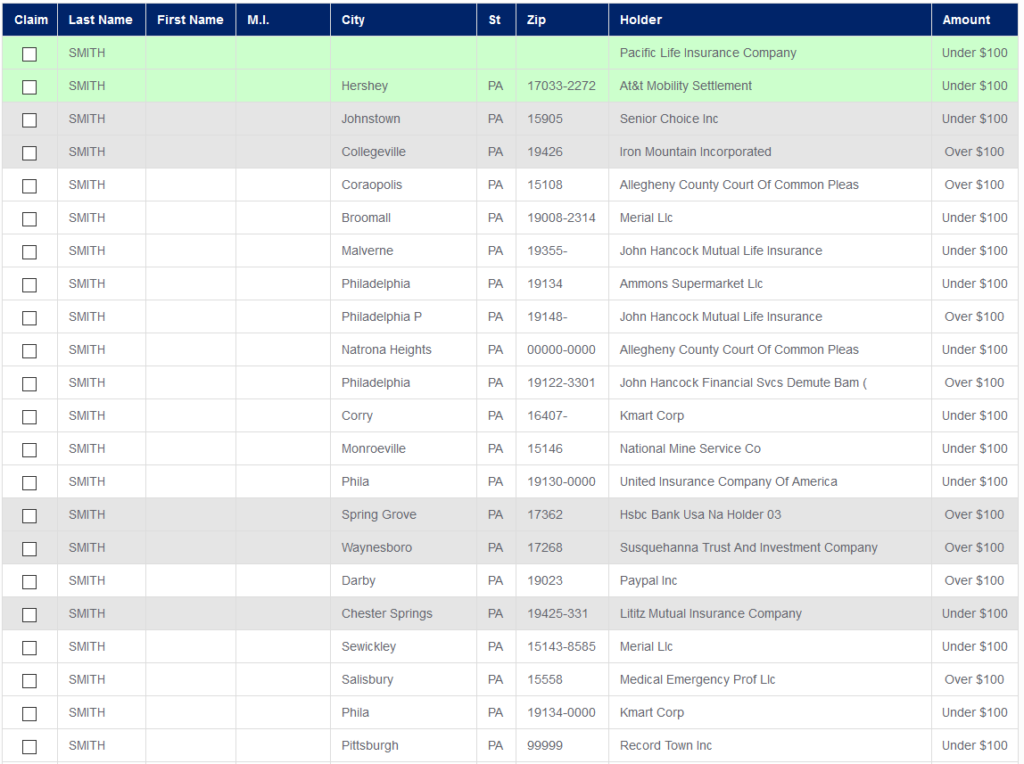
Step 5: Click on the box in the “Claim” column to show that you own the asset. You then need to click on the “Request Claim Form” button at the bottom of the page. The site also lets you reset the page to clear the boxes you checked or perform a new search.
Step 6: Read the detailed information on the top of the page. This shows the amount of the claim and who reported it along with the date that the state received it.

How to Claim Assets in Pennsylvania
Step 1: Use the steps above to reach the State Claim Inquiry form. Complete this form with your full name and other contact information. You also need to show whether your claim is as an individual or business owner or heir. Click on the box at the bottom of the page to save your information if you plan to file multiple claims in Pennsylvania.
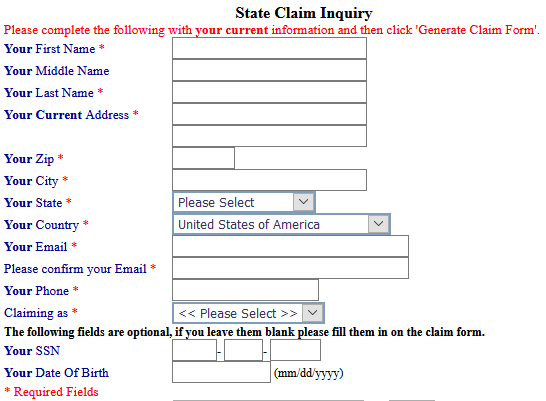
Step 2: Look for the button that says “Generate Claim Form to Print” inside it, which you’ll find on the bottom of the page.
Step 3: Confirm that all the information you added to the form is correct. Print a copy of the form or save the form and print it later.
Step 4: Sign next to the “X” on the bottom of the claim form to show that you’re the claimant. If you need to file with a co-owner, they can sign on the matching line. You need to send this form directly to the Pennsylvania Treasurer. The treasurer will contact you by email, mail or phone if they need anything else.
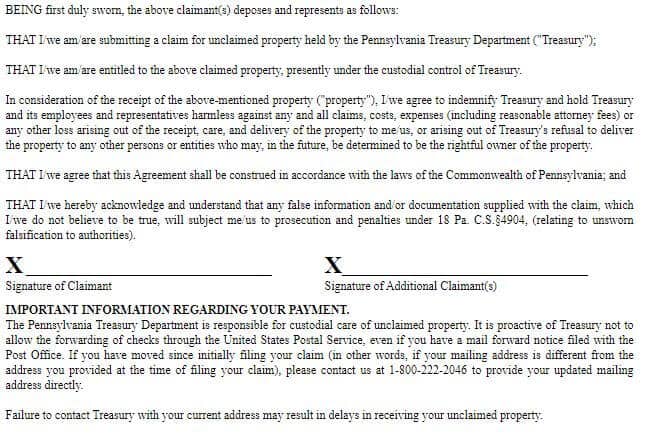
What Information Does Pennsylvania Require from a Claimant?
The type of information that you need to submit will depend on the property that you claim. As the property owner, you need to submit a copy of the claim form and a current photo ID. If the owner or primary beneficiary passed away and you are the next of kin, you need their death certificate. Pennsylvania requires the original check or stock deposit if you file for that type of property and still have the original check or certificate. The Pennsylvania Treasurer will contact you if the department finds that it needs any other information.
How Much Unclaimed Property Does Pennsylvania Have?
Pennsylvania has more unclaimed property than many other states do. As of April 2021, this figure comes to nearly $3.5 billion and includes both tangible and intangible assets. One out of every 10 people who live in the Keystone State have assets that they can claim through the Pennsylvania system. You should not rely solely on the system in this state though. There are lots of other resources and sites that may have money for you. The United States as a whole has $42 billion in unclaimed assets.
Other Resources for Finding Unclaimed Assets
- National Credit Union Administration: With the NCUA, you can find out if another bank claimed the money held in your name by a closed credit union. Credit unions must keep track of the money that they held for others.
- Federal Deposit Insurance Corporation: Similar to the NCUA, the FDIC keeps track of bank records after they close. You can work with the FDIC to claim any former accounts that listed you as the beneficiary or owner.
- U.S. Railroad Retirement Board: The Railroad Retirement Board helps former railroad employees claim their retirement funds later in life. It also offers help for the loved ones of those who had retirement accounts.
- Pension Benefit Guaranty Corporation: Those who worked for other employers can use this website to find out what happened to their pensions. As an heir or beneficiary, you receive steps on how to claim the leftover funds.
- Department of Veterans Affairs: Veterans can work with the VA to secure a loan to open a business or buy a home along with getting life insurance. You can trust the VA to help you find any benefits you qualify for as well as policies that name you as a beneficiary.
- Internal Revenue Service (IRS): The IRS helps you locate refunds that you earned from your taxes but never got. You can use your current bank account to have the check automatically deposited, too.
- U.S. Federal Investments: If you have a treasury bond that reached maturity that you never cashed, this government department can help you get your money. You may even learn about bonds you didn’t know you had.
- Department of Housing and Urban Development (HUD): HUD offers help for those looking to buy homes and those who got help from the department. You can learn about common scams and see if HUD had a refund for you.
- Missing Money: We recommend that you use this website if you ever lived outside of Pennsylvania. You can search for unclaimed assets in dozens of states and check for assets owned by anyone in your family.
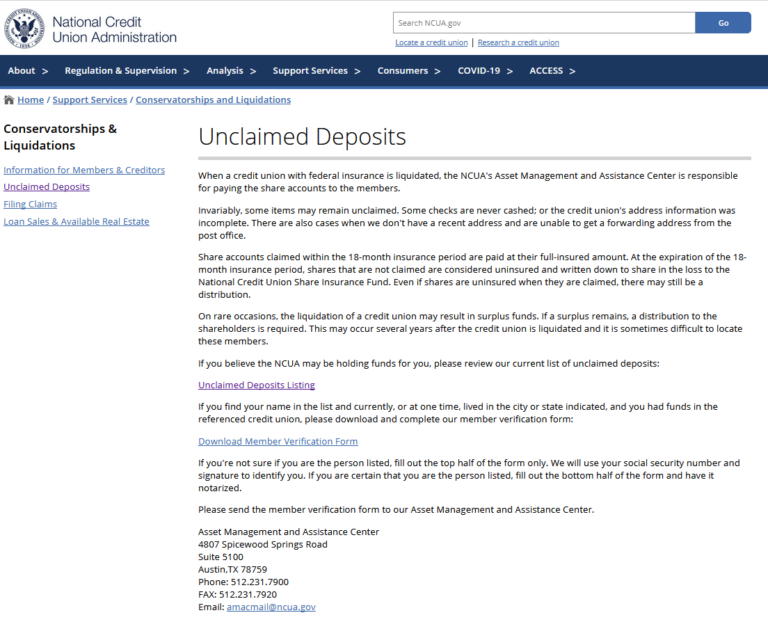
Unclaimed Property Laws in Pennsylvania
Pennsylvania has several laws that cover unclaimed property in the state. You can check the Pennsylvania Treasury website to find those laws or use the law download. This page includes definitions of some of the terms that you need to know and also goes over all of Pennsylvania’s unclaimed property laws.
Pennsylvania Unclaimed Money FAQs
How Can You Check the Status of Your Claim?
The best way to check the status of a claim that you filed is via the unclaimed property status checker. You need to enter the web inquiry number from your claim or the claim ID and hit the “Search” button. The site will show the name associated with the claim to make sure that you pick the right one. You can then see if the state received your claim and will process it or if it already finished the process and sent you a check. The status checker also tells you whether the treasury department needs more information.
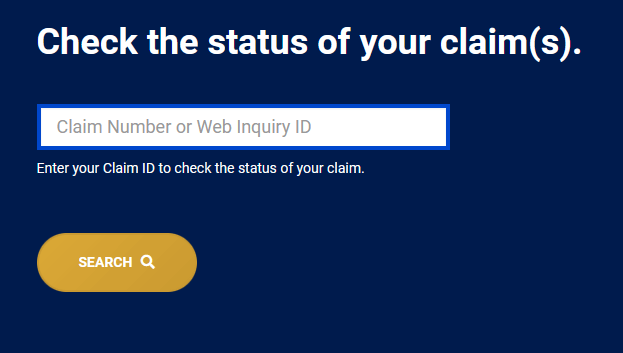
Can You Claim Property Owned by a Deceased Person?
Pennsylvania law grants heirs and others to file claims for property owned by a deceased person. The state will release property with a value of $11,000 or less to the deceased’s spouse if the individual died in the state at least five years ago. If the spouse is no longer living, the asset goes to the child or children and then their parent or sibling. Pennsylvania requires court documents to claim any property with a higher value or if the deceased died less than five years ago. Court documents also allow other family members to claim the property.
To claim property of someone who died with a will, Pennsylvania requires court documents that show the probate court handled the estate and named an executor. The executor can then claim the property and disperse it with the wishes of the will. If your loved one died without a will, you can petition the court to name you as the administrator. This allows you to obtain a certificate to present with the claim form to get the deceased’s property.
Do You Need a Relationship Affidavit?
Pennsylvania will occasionally request a relationship affidavit or Relationship by Entitlement to Decedent Owner Affidavit. This is often required in cases where a living relative wants to claim a property with a low value owned by the deceased. You can only use this form if you did not open an estate for the deceased or the probate court closed the estate more than five years ago. Pennsylvania will allow you to use this affidavit to show your relationship with your loved one and claim their property without showing court documents.
How Does Pennsylvania Get Tangible Property?
Police departments in Pennsylvania have one year to find and return tangible property to people if they do not know the owner before they need to contact the state. In cases where they have a listed owner, they have three years to find the owner before informing the state. Pennsylvania becomes the legal custodian of the property when no one can locate the owner. It also becomes the custodian of safe deposit boxes and their contents if the renter does not pay the box fees or talk to the holder for a period of three years.
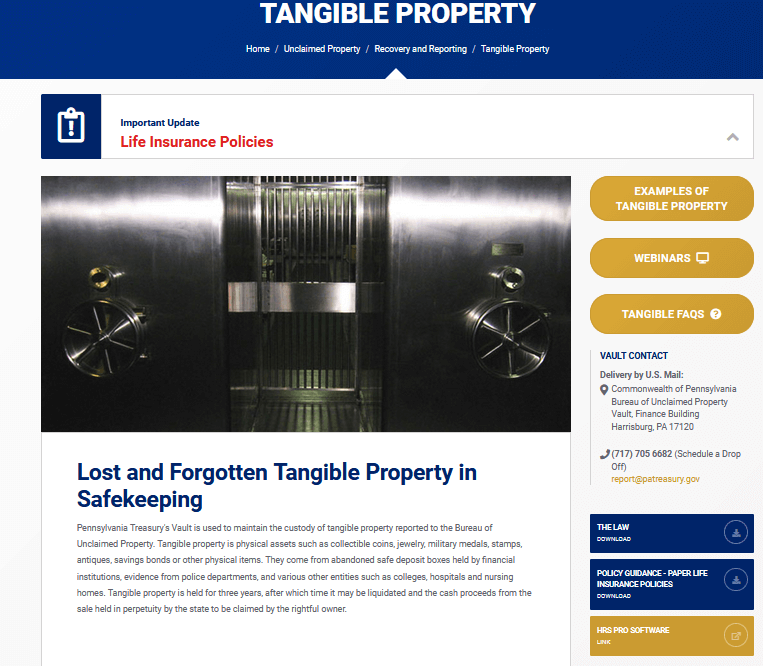
Does Pennsylvania Hold Safe Deposit Box Auctions?
Yes, Pennsylvania does hold auctions for the contents of safe deposit boxes. It requires that the holders create a detailed inventory but will not accept everything found inside a box. Many papers and certificates such as marriage and birth certificates or deeds and land records do not go to the state. The Keystone State holds auctions at different locations across Pennsylvania as well as online and allows anyone to register and bid. If you claim your property after the auction, you will only get a check for the money the items sold during the auction. Though Pennsylvania allows you to claim a box before the auction, you need to pay the total amount that the holder charges, which may include the rental fees for several years.
What Does the State Do with Unclaimed Military Medals?
When banks hand over safe deposit boxes, the contents may include one or more military medals. The Keystone State holds those medals for those who earned them and their families. You will not see these medals go up for sale on the auction block. You can visit the Military Medals website to look for those that belong to your family. Pennsylvania allows you to download the master list, which is available as a PDF. It includes all the medals held by the state.
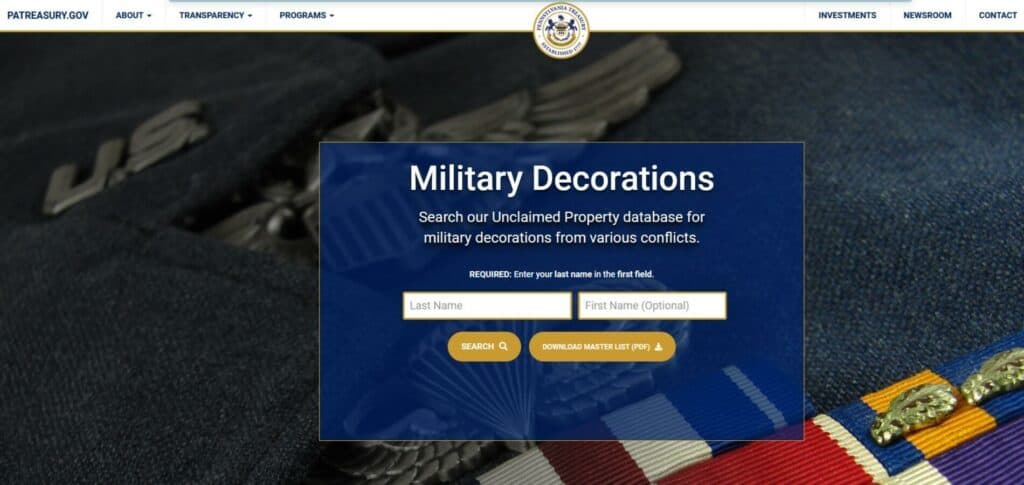
You can also search with the last name of the person who lost the medal. The site will show you the person’s name along with the name and address of the holder, which is usually a bank. You can then claim the medal online and generate a form that shows you are the owner of the medal or an heir of the owner. Pennsylvania requires that you send this form to the treasury department along with all the information and documents listed on the form to get the medal.
What is a Pennsylvania Finder?
A Pennsylvania finder is either an individual or an organization that agrees to find money and other unclaimed property for owners. Pennsylvania requires that all finders register with the treasury department before filing a claim. The department has a list of all registered finders that you can work with on your claim. Finders can charge fees of up to 15% of the value of the property. Those who charge higher fees or violate other laws can lose their ability to file claims in the state. You can contact the treasurer if you want to report a violator. Though you may decide to work with a Pennsylvania finder, the state allows you to complete the claim process by yourself.
How Can You Protect Valuable Assets?
The best way to protect your valuable assets is with detailed records. Keep track of all of your assets along with any that you get in the future. This includes a new safe deposit box that you open and when you change banks. Make sure that all of your asset holders received updated information from you if you need to change your name, phone number, email address or home address. Many people find it helpful to centralize their accounts and have all emails sent to the same address. You’ll also want to let your heirs know where they can find all of your important information if you pass away or need to spend time in the hospital.

Conclusion
Why waste time reading about unclaimed assets on the web? You can search for any assets that Pennsylvania has for you in minutes today. Once you visit the site, you just need to enter your name and find your property. Though Pennsylvania requires that you submit your form through the mail, you can easily check on the status of your claim through your home computer. Check out the steps that we outlined in our ultimate guide to unclaimed money in Pennsylvania before doing your search. You’ll then want to look at other states and federal resources to find even more money.
Quickly Search For Unclaimed Money
Disclaimer: OurPublicRecords mission is to give people easy and affordable access to public record information, but OurPublicRecords does not provide private investigator services or consumer reports, and is not a consumer reporting agency per the Fair Credit Reporting Act. You may not use our site or service or the information provided to make decisions about employment, admission, consumer credit, insurance, tenant screening, or any other purpose that would require FCRA compliance.